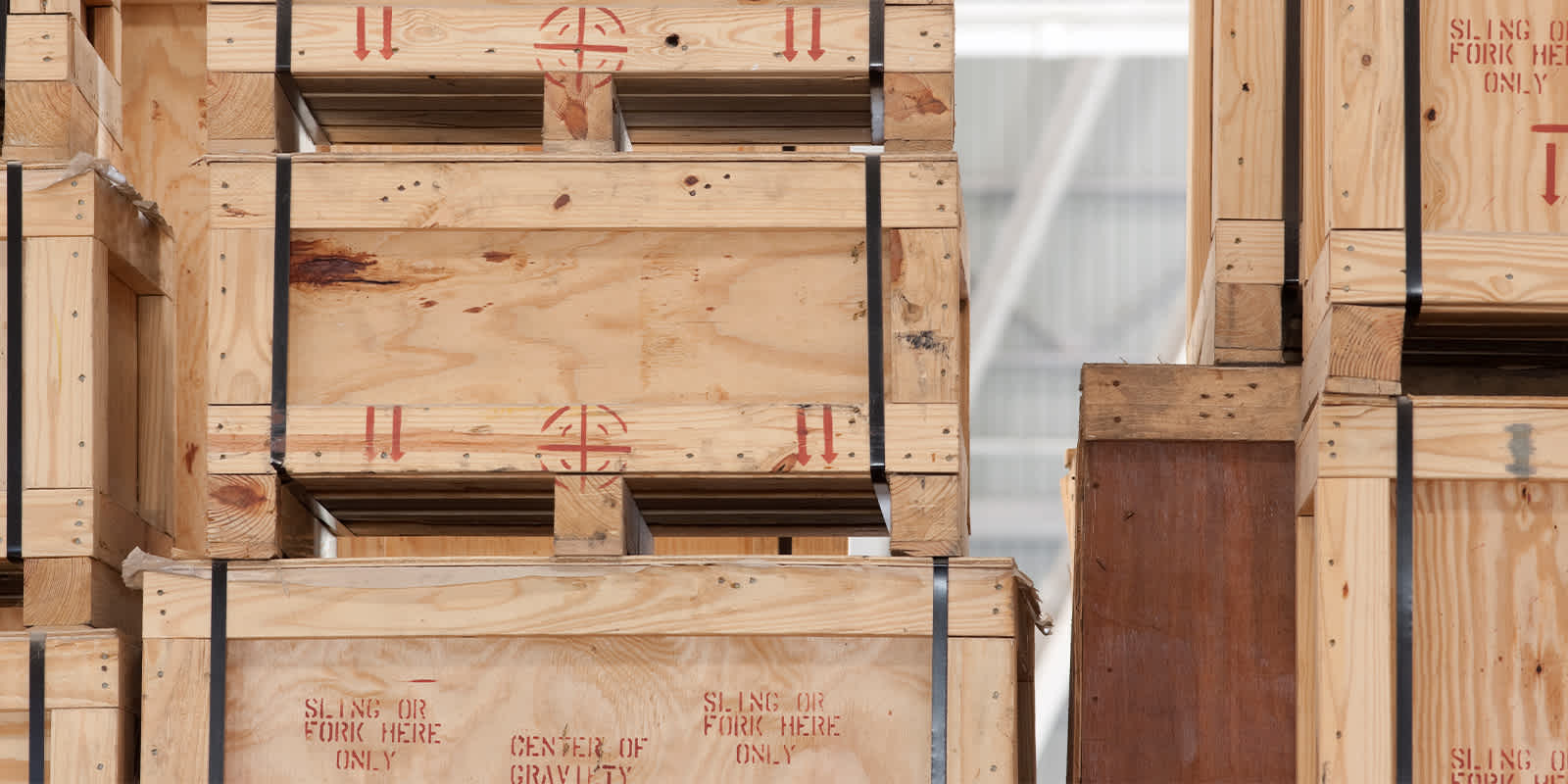
May 4, 2021
Customs RFPs: What to Ask About Cost, Reporting, Data, and More
Customs RFPs: What to Ask About Cost, Reporting, Data, and More
With so much focus on tight shipping capacity, it can be easy to think of customs as just another cost of doing business.
But wait, there are opportunities amid the regulations. A good customs broker is all about finding these opportunities—and you can find one, if you know what to ask in your RFP.
In a recent webinar, Flexport Trade & Financial Services experts Bernie Hart, Tom Gould, and Shameda Shah dug in. They share how to weigh technology, data, reporting, and cost factors alongside the ever-present need to clear goods quickly.
Read the transcript below or for the full conversation, watch Customs Broker RFP Process: Do’s and Don’ts.
Disclaimer: The contents of this webinar are made available for informational purposes only and should not be relied upon for any legal, business, or financial decisions. We do not guarantee, represent or warrant any of the contents of this webinar because they are based on our current beliefs, expectations and assumptions, about which there can be no assurance due to various anticipated and unanticipated events that may occur. This webinar has been prepared to the best of our knowledge and research, however the information presented herein may not reflect the most current regulatory or industry developments. Neither Flexport nor its advisors or affiliates shall be liable for any losses that arise in any way due to the reliance on the contents contained in this report.
Transcript
Excerpted from an auto-generated transcript.
Tom Gould . . . We're talking about that Customs Broker RFP process. You've come to the decision that it's time to start looking at your customs brokers. And you're looking to see, should we be bringing on a new customs broker and who should we select?
So the first question that I recommend that you ask when you're looking at this is, who are the internal stakeholders. So who from the company should you be including in these discussions and who should be leading those discussions and from what I've seen with different clients, I've seen different. Organizations within a company leading the discussions. Typically it's Customs Operations, it's Compliance or someone in one of those Departments . . .
Who Should Lead and Be Involved in Your RFP Process?
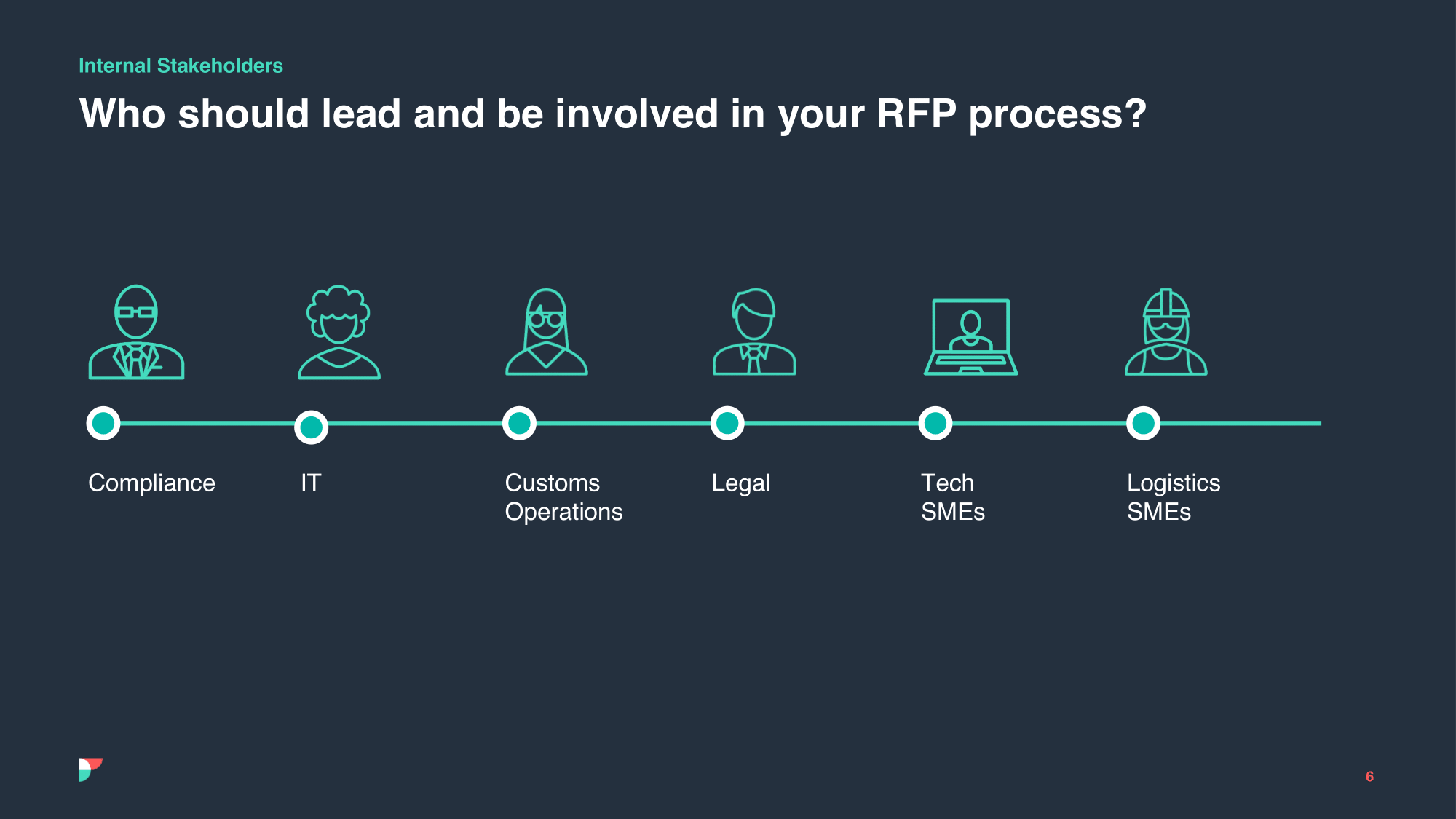
. . . I recommend that you set up a team and set up a regular cadence where you're meeting with a team meeting with people.
If there's going to be any type of integration or if you're going to be using any of your systems, supply the broker with data or to receive data from the broker.
How to Define Your RFP Invitees
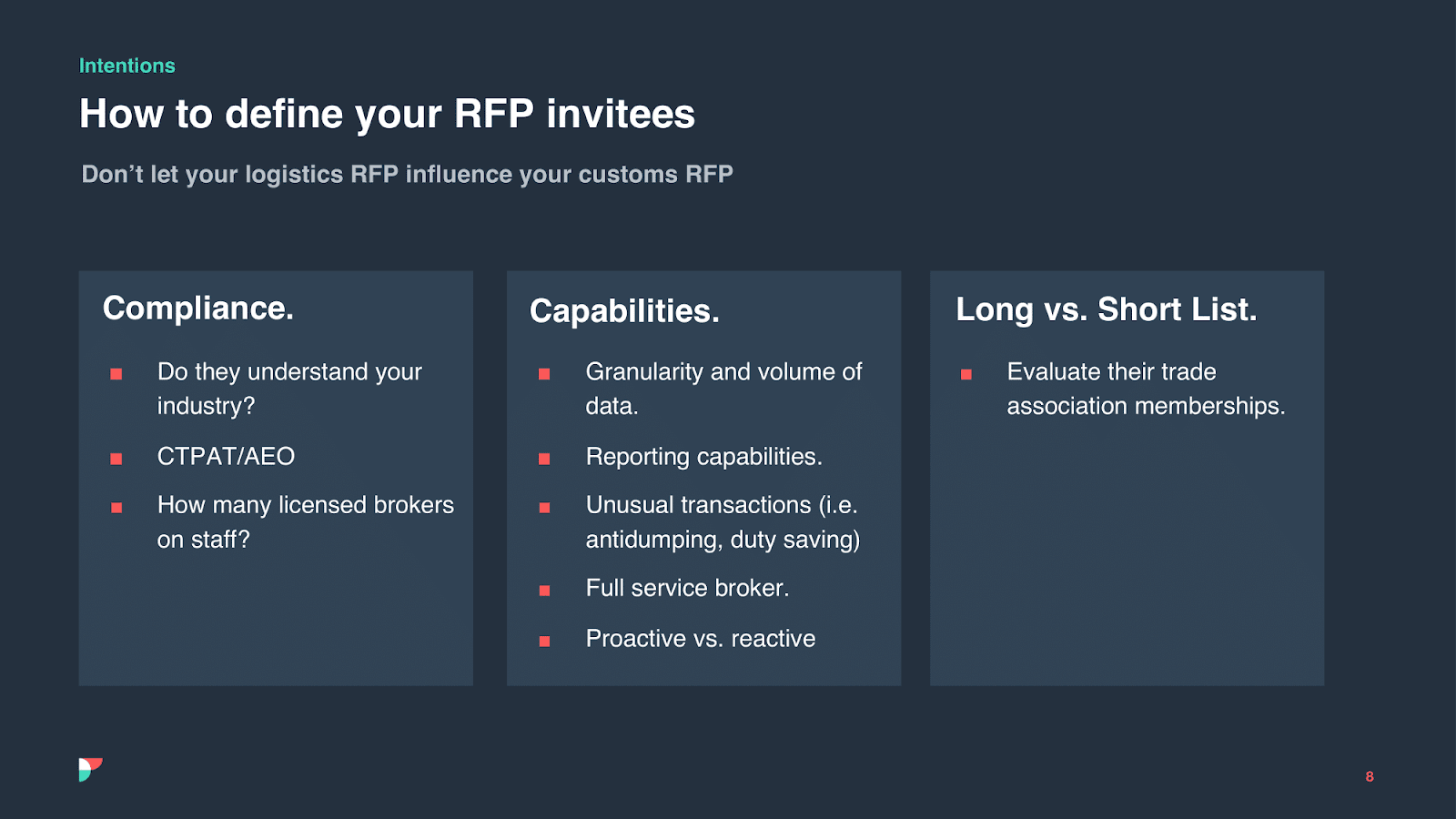
Tom Gould Are the brokers that you're considering, are they experts in your industry?
They're familiar with your products, they're familiar with your issues and so forth.
Some of the other questions that you want to look at is, is the company CTPAT certified?
I would guess that most of you on this webinar are CTPAT certified. And if you are, that's just table stakes, right?
You need to be working with a broker that is certified. If you're going to be working with a broker in multiple countries, you want to make sure that they're AEO certified in the countries where you're going to be using their services.
Tom Gould Another question to ask brokers is how many licensed customs brokers do they have on staff? How many experts do they have that are available to help out with any issues or with any opportunities that may be available to you?
Another question that you want to be looking at is capabilities.
One of the capabilities that I am seeing much more in demand today . . . is data, the granularity of the data. How detailed are they able to get with data?
So we all know here in the US you can run a report out of the ACE web portal, and you can get reporting on your import. But the reporting that you can get out of ACE is simply at the HTS level.
You cannot get details down to the product level, to the style, to the SKU, to the part level.
So one of the questions that you want to be asking your broker is Will your broker be able to fill that gap and provide you reporting similar to the types of reporting you get from the ACE portal, but can they give it to you at the part level?
Read More ACE and Automated Systems
Tom Gould Another question, especially if you're looking for a Global Customs Broker, are they able to provide reporting in a single report for multiple countries?
How is the broker able to handle the reporting for unusual transactions?
For example Can they provide you with a duty saving report? Where they not only calculate the duty that you pay to customs, but they calculate the duty that you would have paid.
Have you taken advantage of a Free Trade Agreement or first sale or some other duty savings strategy? And are they able to report that back to you?
Another question that we're getting today is reporting on carbon costs.
So because the environmental issues are so important, companies are looking at what is the carbon cost of our imports. Is your broker able to report that for you?
Read More Greenhouse Gas Equivalencies Calculator
By looking through all of these items and looking at other information, some other stuff that you should be looking at for your shortlist is potentially recommendations from colleagues.
Tom Gould But another thing is membership and trade associations.
Again, that's something that we, as customs brokers, need to get our information that we can share with you, and we need to get it very timely.
So a question to ask is what trade associations are your customs brokers or your applicants are your candidates members of what other advisory committees and what other ways are they able to get information for you very quickly?
Shameda. You want to share an example for us from a recent RFP?
Shameda Shah Yes. Thank you so much Tom for that.
Most recently I engaged in an RFP with a client that was hyper-focused on duty mitigation, identifying compliance gaps, and also streamlining the brokerage partners that they were utilizing.
They also wanted to set processes across the importers of records and the other business units. So what I did was offer an ACE analysis during the RFP process.
And not only did we uncover compliance gaps, but we helped them develop an internal compliance program.
We found a $1.3 million duty savings opportunity via an exclusion that they were not utilizing. So this is just one example of what an ACE analysis can unlock for you during the RFP process.
Bernie Hart Great. Thank you Shameda and Tom.
I have a question that just came in What is the key difference in Flexport brokerage services versus the competition today?
Tom Gould One of the key differentiators, we're a tech company. We're a company that focuses on technology.
We have a platform that all of our data goes into. And I think that the key differentiator that we provide is really that granular level of data and that global access to data.
So when our clients that work with us want reporting, they're able to pull reporting at that product level at this SKU level.
Read More The New Flexport Platform
Tom Gould So let's talk a little bit about technology.
Cost of Transmitting Data
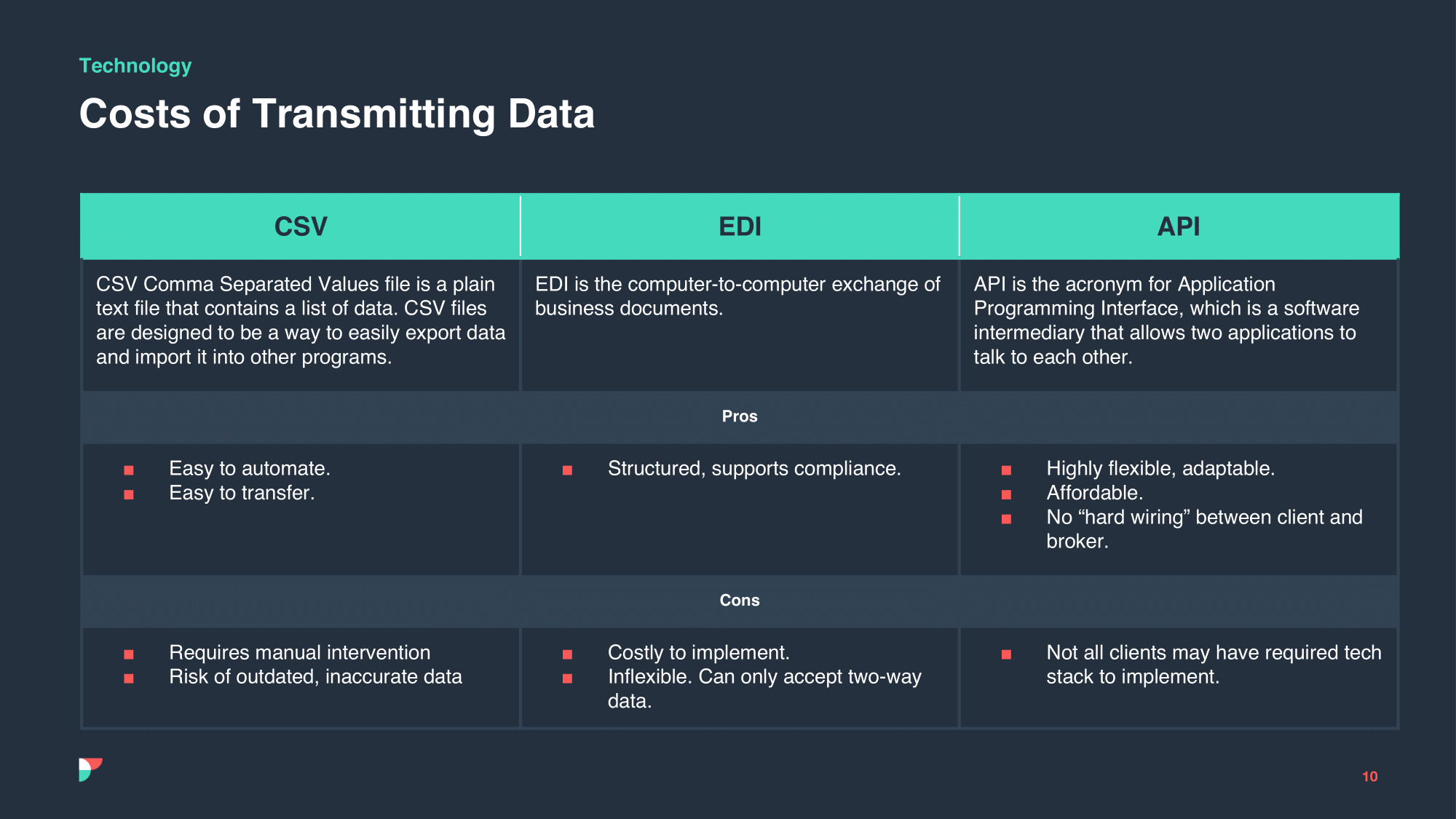
One of the things that you need to understand is that customs data really is some of the most valuable data that you can see within a company.
One of the questions that we are often talking with clients about is how we get the data. And that really is a key issue.
Gone are the days of paper documents. We don't work really with any paper documents—with only a rare exception do we touch pieces of paper.
We still do deal with PDFs and scans of documents, but our more sophisticated clients are actually sending us data electronically that we use to create the customs entry and file those with customs.
And we're also receiving or sending back that data to our clients in various different ways . . . The modern method is API.
API is an acronym for Application Programming Interface. Much more flexible and much more adaptable than an EDI transmission.
API messages can be sent to multiple parties, data can be parsed out. And you don't have to send all of the data. You can send parts of the data.
And it's actually a very inexpensive way to implement the communication.
Unlock the Value of Your Customs Data
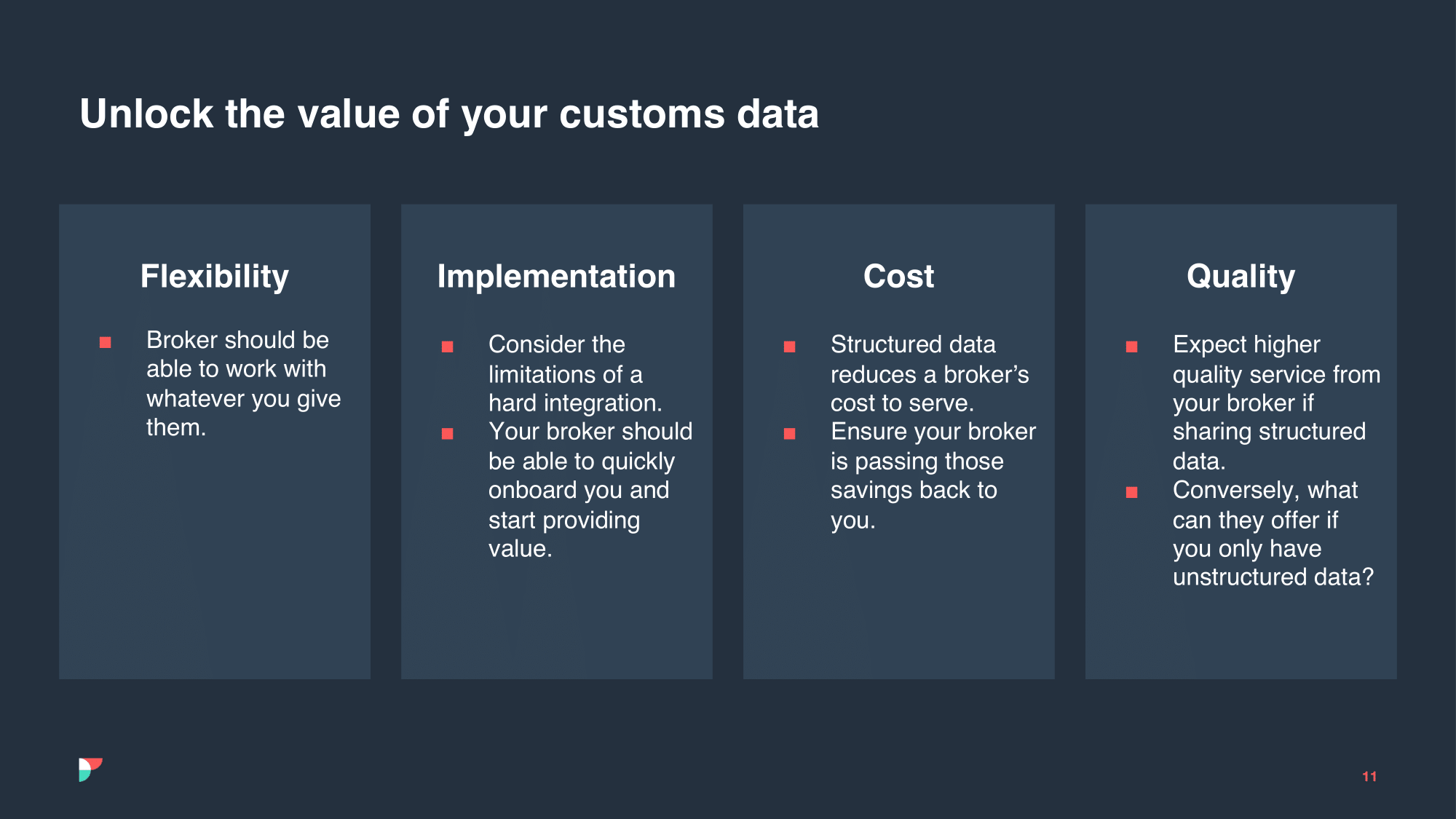
Tom Gould Now, one of the things to remember is that as a customs broker, we're constantly looking at the cost . . .
If you're able to send that data to us electronically, we don't have additional cost and we can come back to you and charge you less for your broker fee, simply because we don't have as much data that we're having to enter.
So it's not just transferring the data to you, but it's what we can do with the data.
We want to make sure obviously there's no errors. But we're also looking at that data to make sure that it's reasonable data. For example, we want to make sure that somebody didn't fat finger something in their system and put in an extra zero causing the value to be reported incorrectly. Or maybe they transpose digits causing a country of origin to be reported incorrectly.
So that's a lot of what we're doing as a customs broker. And again, the more that you can feed that data to us, the more we can focus on quality control and the less we have to spend time on the actual data entry.
What Your ACE Analysis Can Unlock

Tom Gould The broker can review the ACE data for trends and insights in order to understand complexity, seasonality as it serves as a forecast model for your supply chain.
Bernie Hart So another question came in What value-add features should a broker offer to stand out competitively?
Tom Gould It's a decision that your company is going to need to make internally.
The issues are very different when you're looking at an RFP for logistics or for freight.
Because with freight, you're dealing with a volatile freight market.
Whereas with customs, your rate is generally a fixed rate or based on a set, a preset formula so much for entry, so much maybe per line or per classification.
Now, what we found is that companies that separate out the two processes tend to get a better price because we're focused on the customs brokerage. Because we're not looking at the volatility. We're not building in anything for that volatility.
Shameda Shah Yeah. And if you're utilizing multiple forwarders, they’re utilizing multiple brokers. It could be really hard to have set processes, control points, audit logs in place amongst all of those brokers as well.
Tom Gould Yeah. And think about reporting, right?
If you have multiple customs brokers, because you're tied to multiple freight forwarders, are you going to be able to get a standard report from all of the companies? No.
Read More Flexport | Global Customs Brokerage
Bernie Hart The next question Is duty mitigation reality or just fantasy? How does Flexport technology help with leveraging duties and tariffs?
Could you share some insights on that? And then we'll pop it over to Tom as well.
Shameda Shah Last year, we found over $40 million in duty savings opportunities by performing the analysis for our clients. So duty minimization and duty avoidance is not just a buzz term.
It's an actuality. If you leverage the data correctly and you look at it from a holistic standpoint, the possibilities are out there.
Tom Gould It's not a myth.
If you think about a typical company that has a lot of imports, and you look at their finance department and you look at the number of people that they have that are that focus on tax saving opportunities. That number is going to be a large number, a very significant number.
Most duty savings are missed. And that's why having a partner that's a customs broker that focuses on looking for those types of opportunities, is going to be a significant value to you.
Increasing Complexity Necessitates Compliance
Tom Gould One of the things that we have seen over the last few years is that what we do as a customs broker, what you do as an importer has become significantly more complicated.
Read More Tariff Changes Persist, but Structured Data Can Help Capture Duty Savings
And from my discussions with people at customs, I'm hearing that we are going to be seeing more and more scrutiny placed on tariffs, but also more and more scrutiny placed on non-tariff issues.
Things like forced labor, environmental concerns, other social issues that are out there.
We're going to see those being used, being leveraged by customs in their day to day operations. And what we have seen is that complexity really does lead to opportunities.
As long as you're able to master your compliance and you're able to master your data, then you should be in a better position than your competitors.
And one of the things that you can do by leveraging that relationship with your customs broker is you can become a better advisor internally within your company.
Because if you know about something that's coming down the road, sooner than your competitors and you're able to get that messaging up to your executives in your company, they're able to make better decisions and quicker decisions.
So if we know that the next big issue is going to be the carbon content of your shipments and we have the ability to track that on all of your shipments. You're able to show your executives the value of you and your team.
And that's something that I always strongly recommend that my clients do when I'm talking to the compliance manager or the logistics manager within a company.
Be sure that you're on top of all the new issues, and you need to be able to show the direct impact to your company from any of those new issues.
Old Problems Need New Solutions
Tom Gould . . . Most companies look at their customs broker as simply a clerical function . . . They don't look at their customs broker as an advisor.
Shameda Shah Yeah, I would add to that. It's just a reoccurring conversation that we're having here with the pairing of a proactive broker that also leverages data.
And also leveraging data and viewing it from a holistic standpoint, they're looking at the declarations filed.
They're looking at the database, making sure that they're classifying shipments correctly, reviewing the SOP, making sure they understand the business rules, looking at your ACE data.
That's when brokers can truly identify opportunities. So it's that pairing of being proactive and also leveraging data.
Bernie Hart Yeah, that's a great point on the proactive side. Okay. We can move. Go ahead Tom sorry.
Tom Gould Sorry, I was going to chat about the last slide, old problems and the need for new solutions. One of the things that I have seen, and one of the things that really attracted me to coming to Flexport is customs brokerage is an old industry.
There are processes that we do today that go back decades. That hasn't changed in decades.
There was a process you're probably many of you are probably familiar with liquidation, where liquidation back in the days of George Washington happened, because customs was one of the first acts of Congress back in the 1700s. Liquidation happened by posting the notice on the bulletin board at the custom house.
That notice was posted on the bulletin board of the custom house until 2017. We have really ancient processes in customs that are around.
We have lots of processes today that are still built on 1980s, 1990s technologies.
But when you're looking at bringing on a customs broker, one of the key things that you're looking for is modern technology to handle your transactions.
Read More Can You Engineer Lower Duties? Yes, if You Can Find the Customs Codes
Costs for Consideration
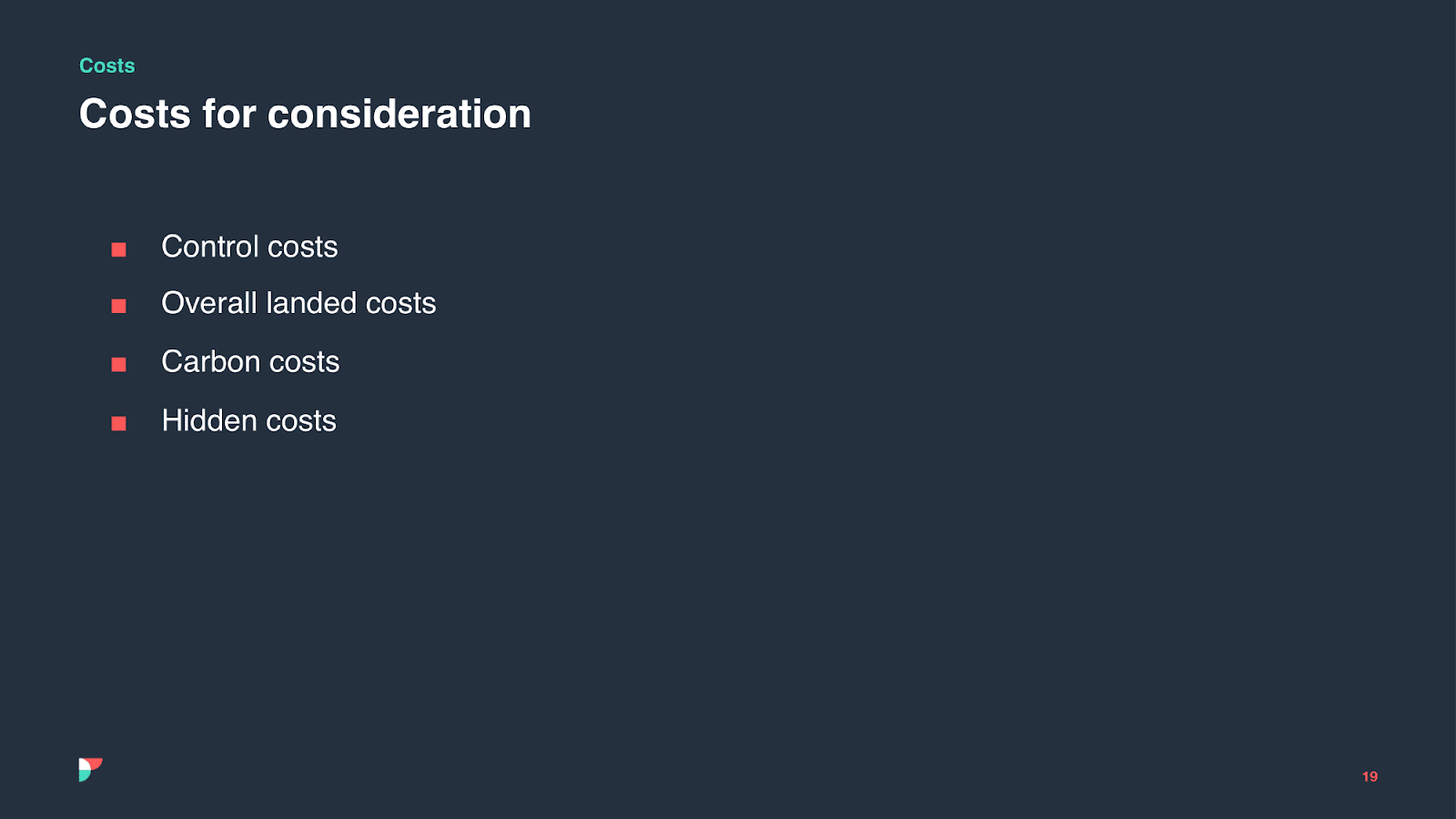
Tom Gould . . . Controlling the cost is one of the aspects that often companies in my mind miss, when they're looking at bringing on a new customs broker.
We often get customers, get RFPs from importers that ask for an all the in cost. They want to know the cost of an entry regardless of the number of lines, the number of PGAs, regardless of the additional work that it will take the customs broker to do the work necessary to file that equity declaration.
And what I can tell you is that as a broker, if we're giving a client a cost that was an all-in cost, we have to make some assumptions that the cost to us for each entry is going to be at the high end.
But if you ask for and you get a cost that allows for differences based on different variability, we can give you better costing overall.
We also want to look at things like you mentioned the carbon cost and the other hidden costs that are out there. Shameda, I think we wanted to talk about hidden costs.
Shameda Shah Yeah. Predominantly around technology and taking advantage of it. If you're not utilizing technology, you could be racking up hidden costs.
To hear the full conversation, watch Customs Broker RFP Process Do’s and Don’ts. Or to join our experts next time and submit your own questions, check out our upcoming webinars.



